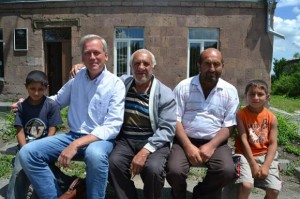NHC and local partners react to pressure and threats to human rights activists in Armenia
10:40, June 18, 2014 | News, Other news Over the last months, Armenian human rights activists have been increasingly subject to pressure and intimidation, and in many cases media is used actively to spread intolerance towards activists and the vulnerable groups they protect, in particular topics of LGBTI and gender. The NHC has responded to this development by joining local partners in an alternative report to the UPR on Armenia and an open statement addressing these issues.
Over the last months, Armenian human rights activists have been increasingly subject to pressure and intimidation, and in many cases media is used actively to spread intolerance towards activists and the vulnerable groups they protect, in particular topics of LGBTI and gender. The NHC has responded to this development by joining local partners in an alternative report to the UPR on Armenia and an open statement addressing these issues.
– Visiting Armenia and talking to the brave activists here, dealing with a range of problematic issues from the lack of adequate housing after the 1988 earthquake to the extensive corruption and inefficiency of the judicial system is impressive, states Secretary General of the Norwegian Helsinki Committee Bjørn Engesland. – Further, activists address these issues in an increasingly difficult working environment with differences internally, with police interference, defamation in media and consequently distrust in the society in general, and with little of the international attention provided to other countries in the region, he adds.
Engesland and Armenia advisor Lene Wetteland are now spending a week in Armenia meeting with various human rights activists in the largest cities. The background is a report on civic activism published by the NHC earlier this year, drawing attention to the growing pressure towards human rights activism and civic activism in Armenia over the last months. Although Armenia has carried out a range of legislative reforms through the framework of Council of Europe and European Association Agreement processes over the last years, several problems remain undealt with and seem to return to the surface now that Armenia is intensifying its cooperation with the Russia-led Customs Union since September 2013.
President Sargsyan’s U-turn sparked great resonance in society, and people turned out in unprecedented numbers to protest the decision and the lacking public debate in advance. However, increased activism has also spurred increased counter activity by the authorities and police in particular, and the mostly government – or oligarch-controlled media increasingly defame activists and the vulnerable groups they defend, spreading hatred and intolerance.
One of the organizations which has experienced increased pressure lately due to their work on LGBTI-rights is New Generation. The car window of one of their staff members was recently smashed in, and in two recent cases have they been defamed in a media outlet run by a parliamentarian from the ruling Republican Party, being called enemies of the nation and defenders of the homo-addicted lobby.
What is more, the “black list of the enemies of the Armenian nation” includes not only established NGO activists, but also the Facebook profiles of a range of people who joined in a campaign after it was known that the Armenian jury overruled the popular vote when Conchita Wurst won the Eurovision Song Contest in May. – On his website, the parliamentarian urges employers to fire or not to employ these blacklisted people, and they include regular people whose only action is to engage in on-line activism, explains the president of the New Generation NGO, Sergei Gabrielyan. – Publishing such a list is a clear violation of freedom of expression and is spreading hate speech and intolerance. We have written to the parliamentarian asking him to retract the statements, but there has been no reaction so far, and we see the need to raise the issue more publicly to counter this defamation, concludes Gabrielyan.
Also Artur Sakunts, head of the Helsinki Citizens’ Assembly Vanadzor is concerned with the increased pressure on human rights defenders and activists in Armenia and initiated an alternative report to the UPR addressing these issues. – The authorities express their discontent using procedural as well as physical methods, explains Sakunts. – On one end, they blatantly ignore our input to procedures where our recommendations should be taken into consideration in accordance with international human rights obligations. On the other end, there is direct harassment of activists and pressure on them via family and colleagues, he says, adding that the media allows only one version of events and contribute to the skewed opinion in society.
Together with the Helsinki Citizen’s Assembly the NHC submitted an alternative report to the 21st Universal Periodical Review of Armenia on 15 June, drawing attention to the increasingly difficult working conditions for human rights defenders and civic activists in Armenia today, and the lack of implementation of obligations in this regard. Additionally, the NHC is co-signatory to a statement condemning the spreading of hate speech and intolerance through media against activists and the vulnerable groups they defend.
Read the report to the UPR here
Read the statement here
